for-gán
- verb [ anomalous ]
-
Ðæt he smeáge hwæt him sý to dónne and to forgánne
that he meditate what is for him to do and what to forgo,
- L. C. S. 85 ;
- Th. i. 424, 6.
-
We lǽraþ, ðæt man freólsdagum and fæstendagum forgá áþas and ordéla
we enjoin, that a man on feast-days and fast-days forgo oaths and ordeals,
- L. Edg. C. 24 ;
- Th. ii. 248, 28 ;
- 25 ;
- Th. ii. 250, 1.
-
He forgǽþ ðæs huses dúru,
transcendet ostium dŏmus,
- Ex. 12, 23.
-
Se ðe ðis forgǽþ [MS. forgæiþ], his sáwul losaþ
he who neglects this, his soul shall perish,
- Homl. Th. i. 92, 2:
-
pricle ne forgǽs
iota non præteribit,
- Mt. Kmbl. Lind. 5, 18.
Bosworth, Joseph. “for-gán.” In An Anglo-Saxon Dictionary Online, edited by Thomas Northcote Toller, Christ Sean, and Ondřej Tichy. Prague: Faculty of Arts, Charles University, 2014. https://bosworthtoller.com/11454.
Checked: 1